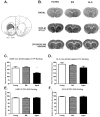Muscarinic receptor/G-protein coupling is reduced in the dorsomedial striatum of cognitively impaired aged rats
- PMID: 22085876
- PMCID: PMC3253526
- DOI: 10.1016/j.bbr.2011.10.048
Muscarinic receptor/G-protein coupling is reduced in the dorsomedial striatum of cognitively impaired aged rats
Abstract
Behavioral flexibility, the ability to modify responses due to changing task demands, is detrimentally affected by aging with a shift towards increased cognitive rigidity. The neurobiological basis of this cognitive deficit is not clear although striatal cholinergic neurotransmission has been implicated. To investigate the possible association between striatal acetylcholine signaling with age-related changes in behavioral flexibility, young, middle-aged, and aged F344 X Brown Norway F1 rats were assessed using an attentional set-shifting task that includes two tests of behavioral flexibility: reversal learning and an extra-dimensional shift. Rats were also assessed in the Morris water maze to compare potential fronto-striatal-dependent deficits with hippocampal-dependent deficits. Behaviorally characterized rats were then assessed for acetylcholine muscarinic signaling within the striatum using oxotremorine-M-stimulated [(35)S]GTPγS binding and [(3)H]AFDX-384 receptor binding autoradiography. The results showed that by old age, cognitive deficits were pronounced across cognitive domains, suggesting deterioration of both hippocampal and fronto-striatal regions. A significant decline in oxotremorine-M-stimulated [(35)S]GTPγS binding was limited to the dorsomedial striatum of aged rats when compared to young and middle-aged rats. There was no effect of age on striatal [(3)H]AFDX-384 receptor binding. These results suggest that a decrease in M2/M4 muscarinic receptor coupling is involved in the age-associated decline in behavioral flexibility.
Copyright © 2011 Elsevier B.V. All rights reserved.
Figures



Similar articles
-
Acetylcholine activity in selective striatal regions supports behavioral flexibility.Neurobiol Learn Mem. 2009 Jan;91(1):13-22. doi: 10.1016/j.nlm.2008.09.008. Epub 2008 Oct 26. Neurobiol Learn Mem. 2009. PMID: 18845266 Free PMC article.
-
Differential involvement of M1-type and M4-type muscarinic cholinergic receptors in the dorsomedial striatum in task switching.Neurobiol Learn Mem. 2008 Feb;89(2):114-24. doi: 10.1016/j.nlm.2007.06.005. Epub 2007 Aug 20. Neurobiol Learn Mem. 2008. PMID: 17709264 Free PMC article.
-
A pentylenetetrazole-induced generalized seizure in early life enhances the efficacy of muscarinic receptor coupling to G-protein in hippocampus and neocortex of adult rat.Eur J Neurosci. 2005 Apr;21(7):1828-36. doi: 10.1111/j.1460-9568.2005.04026.x. Eur J Neurosci. 2005. PMID: 15869478
-
N-Ethylmaleimide differentiates between the M2- and M4-autoreceptor-mediated inhibition of acetylcholine release in the mouse brain.Naunyn Schmiedebergs Arch Pharmacol. 2018 Nov;391(11):1295-1299. doi: 10.1007/s00210-018-1539-8. Epub 2018 Jul 21. Naunyn Schmiedebergs Arch Pharmacol. 2018. PMID: 30032313
-
Modulation of M4 muscarinic acetylcholine receptors by interacting proteins.Neurosci Bull. 2010 Dec;26(6):469-73. doi: 10.1007/s12264-010-0933-0. Neurosci Bull. 2010. PMID: 21113197 Free PMC article. Review.
Cited by
-
Distinct manifestations of executive dysfunction in aged rats.Neurobiol Aging. 2013 Sep;34(9):2164-74. doi: 10.1016/j.neurobiolaging.2013.03.019. Epub 2013 Apr 17. Neurobiol Aging. 2013. PMID: 23601673 Free PMC article.
-
Characterization of social behavior in young and middle-aged ChAT-IRES-Cre mouse.PLoS One. 2022 Aug 4;17(8):e0272141. doi: 10.1371/journal.pone.0272141. eCollection 2022. PLoS One. 2022. PMID: 35925937 Free PMC article.
-
Lifelong environmental enrichment in rats: impact on emotional behavior, spatial memory vividness, and cholinergic neurons over the lifespan.Age (Dordr). 2013 Aug;35(4):1027-43. doi: 10.1007/s11357-012-9424-8. Epub 2012 May 17. Age (Dordr). 2013. PMID: 22592932 Free PMC article.
-
Decline of prefrontal cortical-mediated executive functions but attenuated delay discounting in aged Fischer 344 × brown Norway hybrid rats.Neurobiol Aging. 2017 Dec;60:141-152. doi: 10.1016/j.neurobiolaging.2017.08.025. Epub 2017 Sep 5. Neurobiol Aging. 2017. PMID: 28946018 Free PMC article.
-
Interaction of basal forebrain cholinergic neurons with the glucocorticoid system in stress regulation and cognitive impairment.Front Aging Neurosci. 2015 Apr 2;7:43. doi: 10.3389/fnagi.2015.00043. eCollection 2015. Front Aging Neurosci. 2015. PMID: 25883567 Free PMC article. Review.
References
-
- Aubert I, Rowe W, Meaney MJ, Gauthier S, Quirion R. Cholinergic markers in aged cognitively impaired Long-Evans rats. Neuroscience. 1995;67:277–292. - PubMed
-
- Bäckman L, Lindenberger U, Li S-C, Nyberg L. Linking cognitive aging to alterations in dopamine neurotransmitter functioning: Recent data and future avenues. Neuroscience & Biobehavioral Reviews. 2010;34:670–677. - PubMed
-
- Boulougouris V, Dalley JW, Robbins TW. Effects of orbitofrontal, infralimbic and prelimbic cortical lesions on serial spatial reversal learning in the rat. Behavioural Brain Research. 2007;179:219–228. - PubMed
Publication types
MeSH terms
Substances
Grants and funding
LinkOut - more resources
Full Text Sources
Medical

